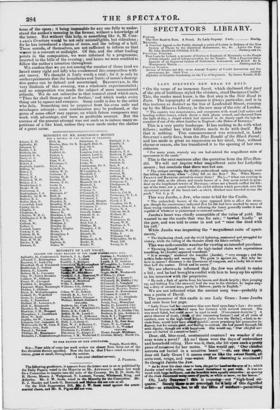LADY STEPNEY'S NEW ROAD TO RUIN.
" ON the verge of an immense forest, which sheltered that part of the pile of buildings styled the cloisters, stood Darmaya Castle." This, the reader must know, is the first step in the New Road to Ruin. The topography of romance is always particular, and is in this instance as distinct as the line of Leadenhall Street, running up by the Minerva Library, in the new map of' the city of London.
" The country was mountainous, and overgrown with wood (tall cedars and bending willow-trees), which threw a dark gloom around, and obscured from the light of day, a chapel which had received in its dreary vault the last de- scendant of one of the oldest families in England—the Dukes of Darmaya."
This is a very pretty landscape. It has nothing to do with what follows ; neither has what follows much to do with itself. But that is nothing. This commencement was extracted, in Lady STEPNEY'S earl; days, from the Blue Bandit of the Black Forest; and has made so great an impression on her mind, that, without rhyme or reason, she has transferred it to the opening of her own romance.
" For many years, scarcely any one had entered the magnificent suite of apartments in the castle."
This is the next sentence after the quotation from the Blue Ban- dit. We will not inquire what magnificent suite her Ladyship means ; but conclude that there was but one.
" The antique carvings, the thickly-embroidered satin-velvet hangings, were fast falling into decay, when "—[they fell on the floor ? No. When Messrs. FRANCE and BANTING arrived to renew them? No.]—" when one evening in the year 160:3, as the silvery and steady beams of a July moon rested in gran- deur on the lengthened towers of Darinaya—when not a breath ruffled the foli- age of the trees, nor a sound broke the awful stillness which prevailed, save the occasional scream of the forest owl—a short, thickset man hurried across the park." Vol. I. p. 2.
This was Jacobs, a Jew, who came to bid for the Castle.
" The melancholy beauty of the scene appeared little to affect the stran- ger, though his countenance indicated tTiat his life had been marked by many of those trying vicissitudes, which by softening the heart, generally render it sus- ceptible of whatever is picturesque in external nature."
Jacobs's heart was chiefly susceptible of the value of gold. He wanted to see the castle that was for sale; " bawled loudly" at the gate, and was told to come in and not "raise the dead with his yell."
While Jacobs was inspecting the "magnificent suite of apart- ments," " The blackening cloud, and the vividlightoing, contrasted and struggled for victory, while the rolling of the thunder shook the fabric awfully."
This was unfavourable weather for viewing an intended purchase. "Throwing himself into one of the high-backed chairs with superstitious trembling, he [Jacobs) appeared transfixed."
" It is strange," muttered the traveller [Jacobs), "very strange ; and the welkin looks murky and menacing. The guise is against me. But why be- lieve in omens? discovery is the forerunner of conquest, and a luck}, hit is more than half the matter. Drink and be merry."
We are afterwards informed that the Jew was afraid to make a bid ; and he had brought a cordial with him to keep up his spirits in his interview with the proprietor.
"He took a flask of spirits from his bosom, and drank largely; then jumping up, and bidding Fen [the steward] lead the way to the cloisters, he began sing- ing a ditty of ancient days, partly in Hebrew, partly in English."
We are not informed what the ancient song was—probably it was a psalm of David.
The possessor of this castle is one Lady Grace : Isaac Jacobs had once been her page.
" Lady Grace had her expressive blue eyes fixed upon Isaac's face: the recol- lection of bygone davictiosbed upon her memory with revived interest. She was much faded, but conkl4tever be aged in soul. [Convenient doctrine!) A strict observer of truth, [theelit,of this interesting feature!) and of all rules of conduct, even to the high- lnelMtiquette [who won the Derby), which to de- viate from, would have been ~painful—never practising her persuasive in- fluence, but for certain OK and reirlitg to mislead, she had pissed through life with dignity, though notwith happiness. She woukl say, Our chiefest sor- rows are buried in a sensitive heart."
Dear, old, blue-eyed, sentimental creature! we wonder if she ever wrote a novel? Ah no ! those were the days of embroidery and household ruling. How was it, then, she hit upon such a pretty piece of nonsense for her motto. "She would say, Our chiefest sorrows are buried in a sensitive heart --ah, say that again, dear old Lady Grace ! it comes over us like the sweet South, all orris-root, rouge, and rose-water. Haw charming is sentiment ! So thought Jacobs the Jew.
"As he drew his chair close to hers, she put her hand on the arm of it; which Jacobs seized with avidity, and seemed disinclined to pact with. It was co- vered with large brilliants, and the bracelets were equally attractive: an opening of the cloak dismayed many yaws of pearls, as white as snow, on her bosom."
Oh, Lady z60! this is coquetry—not "high-bred eti- quette." &Only Owi no precede* for it lady of this dignified order—so attentive, too, to all the rifles of conduct—permitting


















 Previous page
Previous page